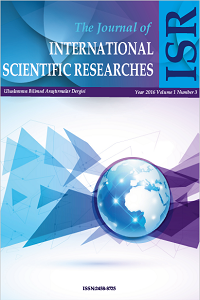Osmanlı Düşüncesinde İktisat Fikri: Layihalar ve Ahmet Cevdet Paşa Özelinde İnhitatçı İktisat Düşüncesinin Evrimi
Abstract
Osmanlı siyaset ve toplum düşüncesinde
iktisat fikri zaman içerisinde peyderpey yer edinmiştir. Osmanlı düzeninin
bozulmaya yüz tuttuğu 16. yy.dan itibaren siyasetname ve layihalarda bozulan
düzeni tekrardan ihdas etmeye yönelik fikirler 19. yy’ın başından itibaren
vurguyu siyasi erkten ziyade iktisadi etkenlere yapmaya başlamışlardır.
Modernleşmenin iyice hissedildiği 19. yy’ın ikinci yarısında ise vurgu tamamen
iktisadi alana kaymıştır.
Düzenin bozulmasının “inhitat” kavramıyla
açıklandığı Osmanlı düşüncesinde güçlü bir ibn-i Haldun etkisi görülmektedir.
Bu düşünce geleneğinin önemli bir temsilcisi sayılan Ahmet Cevdet Paşa’nın
görüşleri çerçevesinde inhitatçı gelenekte sosyal değişmenin parametrelerinde
meydana gelen dönüşüm tartışılmaya çalışılacaktır.
References
- -
The Idea of Economics in Ottoman Thought: The Evolution of Inhitatçı Economist Thought Special to Layihalar and Ahmet Cevdet Pasha
Abstract
The idea of economics in Ottoman politics
and society's thinking has taken place in time. From the 16th century when the
Ottoman order was in ruins, ideas for creating layoffs has began to emphasize
political factors rather than economic factors from the beginning of the 19th
century. In the second half of the 19th century, when the modernization was
felt well, the emphasis shifted completely to the economic field.
A strong ibn-i Haldun effect is observed in
the Ottoman thought, which is explained by the concept of "inhitat".
Within the framework of the views of Ahmet Cevdet Pasha, who is considered to
be an important representative of this thought tradition, the transformation
that takes place in the parameters of the social change in the inhitat
tradition will be tried to be discussed.
References
- -
Details
| Journal Section | Articles |
|---|---|
| Authors | |
| Publication Date | November 15, 2016 |
| Submission Date | December 1, 2016 |
| Published in Issue | Year 2016 Volume: 1 Issue: 3 |


